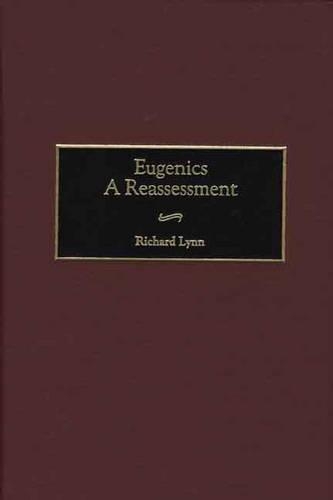
Eugenics: A Reassessment
(Hardback)
Publishing Details
Eugenics: A Reassessment
By (Author) Richard Lynn
Bloomsbury Publishing PLC
Praeger Publishers Inc
30th June 2001
United States
Classifications
Tertiary Education
Non Fiction
363.92
Physical Properties
Hardback
380
Width 156mm, Height 235mm
680g
Description
Richard Lynn argues that the condemnation of eugenics in the second half of the 20th century went too far and offers a reassessment. The eugenic objectives of eliminating genetic diseases, increasing intelligence, and reducing personality disorders he argues, remain desirable and are achievable by human biotechnology. In this four-part analysis, Lynn begins with an account of the foundation of eugenics by Francis Galton and the rise and fall of eugenics in the 20th century. He then sets out historical formulations on this issue and discusses in detail the desirability of the new eugenics of biotechnology. After examining the classical approach of attempting to implement eugenics by altering reproduction, Lynn concludes that the policies of classical eugenics are not politically feasable in democratic societies. The new eugenics of human biotechnology - pre-natal diagnosis of embryos with genetic diseases, embryo selection and cloning - may be more likely than classic eugenics to evolve spontaneousely in western democracies. Lynn looks at the ethical issues of human biotechnologies and how they may be used by authoritarian states to promote state power. He predicts how eugenic policies and dysgenic processes are likely to affect geopolitics and the balance of power in the 21st century. Lynn offers a provocative analysis that should be of particular interest to psychologists, sociologists, demographers, and biologists concerned with issues of population change and intelligence.
Reviews
[A] fascinating, multi-faceted book.Professor Lynn sets outs to rescue eugenics from the lowly place to which it fell in the latter half of the twentieth century. It is an ambitious project, and Lynn emerges with scientific and ethical orthodoxy on many fronts. He does this with enthusiasm, moving effortlessly between history, genetics, demographics and ethics before delivering a startling prediction about the central role eugenics will play in 21st century world politics....A new debate is needed, and professor Lynn's book lays a provocative challenge to those who wish to avoid the dystopian future he foresees.-King's Parade
[A]fter reading this excellent, scholarly book, one cannont reasonably disagree with him on any point unless one can find an argument he has not already refuted.-Contemporary Psychology
[P]acked with information. It's arguments are likely to stimulate some readers but to provoke many others.-Population and Development Review
[T]his book should be read by everyone concerned about the "brave new world" the advancement of human biotechnology allows. General readers; upper-division undergraduates through professionals.-Choice
[T]hose scholars who are in need of inspiration in this pursuit would benefit from consulting Lynn's book.-Isis
[W]ell written and readable.-Intelligence
Highly readable....Describes and answers many of the ethical issues that have been raised about human biotechnologies.-Personality and Individual Differences
[W]ell written and readable.Intelligence
"A fascinating, multi-faceted book.Professor Lynn sets outs to rescue eugenics from the lowly place to which it fell in the latter half of the twentieth century. It is an ambitious project, and Lynn emerges with scientific and ethical orthodoxy on many fronts. He does this with enthusiasm, moving effortlessly between history, genetics, demographics and ethics before delivering a startling prediction about the central role eugenics will play in 21st century world politics....A new debate is needed, and professor Lynn's book lays a provocative challenge to those who wish to avoid the dystopian future he foresees."-King's Parade
"After reading this excellent, scholarly book, one cannont reasonably disagree with him on any point unless one can find an argument he has not already refuted."-Contemporary Psychology
"Packed with information. It's arguments are likely to stimulate some readers but to provoke many others."-Population and Development Review
"This book should be read by everyone concerned about the "brave new world" the advancement of human biotechnology allows. General readers; upper-division undergraduates through professionals."-Choice
"Those scholars who are in need of inspiration in this pursuit would benefit from consulting Lynn's book."-Isis
"Well written and readable."-Intelligence
"[A]fter reading this excellent, scholarly book, one cannont reasonably disagree with him on any point unless one can find an argument he has not already refuted."-Contemporary Psychology
"[P]acked with information. It's arguments are likely to stimulate some readers but to provoke many others."-Population and Development Review
"[T]his book should be read by everyone concerned about the "brave new world" the advancement of human biotechnology allows. General readers; upper-division undergraduates through professionals."-Choice
"[T]hose scholars who are in need of inspiration in this pursuit would benefit from consulting Lynn's book."-Isis
"[W]ell written and readable."-Intelligence
"Highly readable....Describes and answers many of the ethical issues that have been raised about human biotechnologies."-Personality and Individual Differences
"[A] fascinating, multi-faceted book.Professor Lynn sets outs to rescue eugenics from the lowly place to which it fell in the latter half of the twentieth century. It is an ambitious project, and Lynn emerges with scientific and ethical orthodoxy on many fronts. He does this with enthusiasm, moving effortlessly between history, genetics, demographics and ethics before delivering a startling prediction about the central role eugenics will play in 21st century world politics....A new debate is needed, and professor Lynn's book lays a provocative challenge to those who wish to avoid the dystopian future he foresees."-King's Parade
Author Bio
RICHARD LYNN is Professor Emeritus of Psychology, University of Ulster, Northern Ireland./e Professor Lynn has held positions at the University of Exeter and the Dublin Economic and Social Research Institute. Among his earlier publications are Educational Achievement in Japan and Dysgenics: Genetic Deterioration in Modern Populations (Praeger, 1996).
